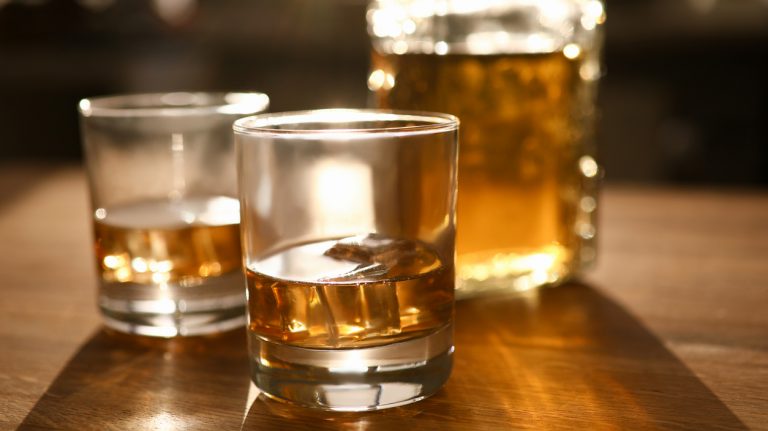
While whisky opinions vary as widely as the flavors that come from a barrel, every whisky lover I know shares this one: Producers should be open and honest about what they’re putting in the bottle. The demand for transparency is strong and abiding. But what happens when clear language runs head-on into protected terminology?
Earlier this month, the Scotch Whisky Association (SWA) filed a lawsuit in the U.S. District Court of Delaware against Virginia Distillery Co. (VDC), alleging that the American distillery was misleading consumers to believe their Virginia-Highland whisky is scotch. The complaint opens by pointing out two specific words on the label—“Highland” and “whisky”—as problematic. The Highlands are one of Scotland’s five legally protected whisky regions, while the spelling of “whisky” without an E is used for scotch. (“Whiskey” is more common in the U.S., although both spellings are permitted.) The lawsuit also notes that VDC has a product called “Scotch Trooper Cask,” named for the popular blogger and photographer who combines his love of Star Wars and whisky.
Scotch is the most heavily regulated whisky category in the world, governed by the Scotch Whisky Regulations of 2009, which outline how it can be produced and what terminology may be used on labels. The SWA represents Scotland’s whisky makers and has an obligation to fight brands misusing protected terms or imitators trying to pass themselves off as scotch. It has taken down counterfeiters and helped scotch maintain its sterling reputation for integrity and quality. In fact, the SWA legal team has been recognized for its effectiveness, awarded the best Not For Profit Organization Team of the Year at the World Trademark Review Awards in Boston in May. At any given moment, the organization is handling 60-70 court cases around the world, along with investigations and trademark violations.
But VDC isn’t trying to trick anyone: It’s being completely honest. The Virginia-Highland whiskies blend VDC’s own-make single malt with blended malt sourced from Scotland’s Highlands region—hence the name “Virginia-Highland,” which nods to both places of origin. The moniker is doubly apt because VDC is located in Lovingston, Virginia, at the foot of the Blue Ridge Mountains, an area often referred to as the state’s Highlands.
The lawsuit alleges that VDC’s “labelling of its products intentionally misidentifies the true geographic origin of its products in an effort to trade on the good will and prestige associated with Scotch Whisky.” Yet the label couldn’t be more clear about what’s in the bottle: “whisky from Scotland married with Virginia whisky distilled from malt mash.” The side label reads, “Marrying whisky from the Old World with ours made in the Highlands of Virginia, aged at least one year, yields a distinguished and complex spirit.” The producer identification is also accurate: “Bottled by Virginia Distillery Co.”—not “Distilled by” or even “produced by,” because they didn’t make everything in the bottle.
All of this language is transparent and precise, something that can’t be said of many other whisky labels. And it delivers exactly what whisky lovers want, which is honesty and information. Yet the SWA alleges that it can be misconstrued to seem like the whisky is actually scotch, and that this is VDC’s intention, because it wants “to evoke an improper association with Scotland in order to more effectively promote and sell its products.”
But this association with Scotland can’t be considered improper and—if VDC aims to be transparent that some of the blend comes from Scotland—it can’t be avoided. VDC’s decision to blend its young whiskey with sourced product, while the majority of the house-made whiskey ages, isn’t unusual among new American distillers; it’s just more common for the sourced whiskey to be bourbon or rye rather than scotch. (It’s worth pointing out that High West Distillery accurately labels Campfire as made with “blended malt scotch whisky” along with its straight bourbon and rye components.) VDC is planning to release its 100% house-made single malt later this year under the name Courage & Conviction—an entirely separate brand from Virginia-Highland whisky.
It’s obvious where my opinion falls in this matter, and I’ll readily admit that I’m a fan of Virginia-Highland whisky, especially the Cider Cask-Finished that was named No. 13 in Whisky Advocate’s 2018 Top 20. But the law is clearly on the side of SWA. As the filing correctly notes, the U.S. Federal Code of Regulations precludes the use of the words “Highland” and “Scotch” on a whisky that is not wholly produced in Scotland, and both words appear on the VDC label. VDC might make a case through its association with the Virginia Highlands geographic area, but the SWA will be able to oppose that.
This isn’t the SWA’s first tangle with transparency; it has censured producers like Compass Box that want to include blend component details on the label, much to the dismay of many whisky lovers who’d like to know that information. And if it’s successful in this lawsuit against VDC, whisky drinkers will be worse off. Scotch may require protection from reputation-damaging fakes, but when that effort leads to greater obfuscation, standing in the way of honest and transparent facts, the SWA is pitting its own interests against those of whisky drinkers everywhere.
Update 8/28/19: Virginia Distillery Co. and the Scotch Whisky Association have reached a mutual agreement, with VDC dropping the word Highland from their labels. Gareth Moore, Virginia Distillery Company’s CEO, said in a statement: “We stand behind the quality of the Virginia-Highland Whisky products and the awards and general recognition they have received the past three-plus years, but are happy to work with the Scotch Whisky Association to ensure that there is no chance of confusion about our products. From the start, Virginia Distillery Company has been transparent about the nature of our products, which have been recognized for their quality, and we are committed to growing and championing the American Single Malt Whisky category.”





